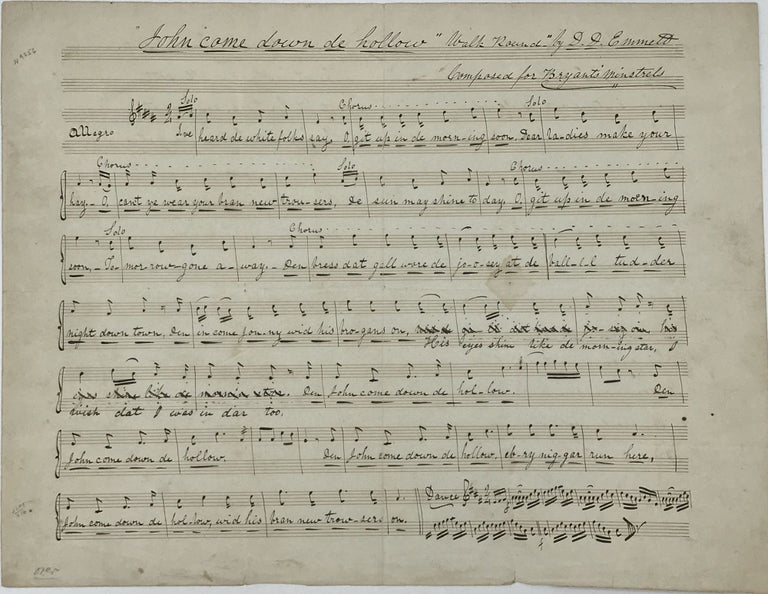
AUTOGRAPH MANUSCRIPT TITLED AND SIGNED, "JOHN COME DOWN DE HOLLOW. 'WALK ROUND' BY D.D. EMMETT. COMPOSED FOR BRYANT'S MINSTRELS" FOR SOLO VOICE AND CHORUS.
ca.1859. Oblong folio sheet, 7 1/4 x 14 in., staff ruled by hand in red ink. Music notation with corrected lyrics on recto, additional verses on verso.
An extremely rare, complete vocal score, with accompanying dance, entirely in Emmett's hand. Emmett joined Dan Bryant's minstrel troupe in 1859, when the company introduced his "Dixie" on the New York stage, as well as the present composition, for which sheet music evidently was published in 1860, although locating a recorded copy has proved unsuccessful.
Virtually all of Emmett's manuscripts were deposited early on in the Ohio State Library, and are now in the archives of the Ohio History Connection. There are three drafts of the 'John Come Down de Hollow' there: a pencil ms. of words only, entirely different from the finished version, about a slave pursued by a bulldog in the rain; a fragment of Emmett's walk around in a different key, a variant setting, and the first two lines of lyrics only, dated 1860; and a fair copy dated 1859, comparable to ours, with full score and extra verses on the verso. Ours contains a textual revision not in the OHC copy. Item #62033
The lyrics of Emmett's song involve the dandy John's courtship advice to the ladies on how to avoid ending up an old maid, the dandy John, and the efforts of the singer to avoid marriage. Written in dialect, with the usual stereotypical transgressions, such lyrics are now generally accepted as having been appropriated and adapted from African-American sources. Intriguingly, William Cullen Bryant collected the lyrics of a work-song version of 'John Come Down de Hollow' from slave sources during a visit in 1843 to a plantation in South Carolina. There, "he witnessed a corn-shucking, arranged for his benefit by the obliging proprietor [unnamed, but it may have been William Gilmore Simms.] (See Norris Yates "Four Plantation Songs Noted by William Cullen Bryant," in Southern Folklore Quarterly, v. 15, 1951.) As described by Bryant, "The negroes began to strip the husks from the ears...keeping time to the music...the songs were generally of a comic character, but one of them was set to a singularly wild and plaintive air, which some of our musicians would do well to reduce to notation." The differences between Bryant's 'plaintive' version and Emmett's provides a rare documentation of the typical way in which African-American sources were changed into comic minstrel repertoire.
At the conclusion of the vocal score is a "Dance" in ten measures, which would have been the 'walk round' element of the song mentioned in the title, a minstrel dance which Emmett introduced in 1859 to the Bryant's Minstrels' performance routine, one which typically closed the first half of the show. It is generally thought to have its origins in African circle shouts brought over by slaves, and typically included a competitive element in which each dancer gets a chance to display his best moves, while others clap or 'pat Juba' on their bodies. All stops were pulled out for these boisterous minstrel finales, which were soon adopted by other bands, and Emmett's walk-'rounds defined the type, and are considered his most significant contribution to minstrelsy. Hans Nathan devotes an entire chapter to the walk-'rounds in his definitive biography of Emmett, and closes with particular mention of "John Come Down de Hollow." As previously mentioned, the song was evidently published as sheet music, but Nathan could not locate a copy, nor have we succeeded.
Although he is today remembered chiefly as the composer of "Dixie," Emmett's importance to minstrelsy, the overwhelmingly dominant American musical entertainment of the 19th century, can hardly be underestimated. He was a founding member in 1843 of the Virginia Minstrels, generally accepted as the first black face Negro minstrel troupe with what would become the full complement of banjo, fiddle, bones and tambourine. Their popularity and influence quickly spawned the genre, with numerous imitators on both sides of the Atlantic, and the devoted following of both white and black audiences. He was an accomplished banjoist, and his many compositions were central to the repertoire. Hollywood produced a movie of his life starring Bing Crosby in 1940, and he was inducted into the Song Writer's Hall of Fame in 1970. For the definitive study of Emmett and his music, with an entire chapter on Emmett's walk-rounds, see Hans Nathan's "Dan Emmett and the Rise of Early Negro Minstrelsy." Apart from later transcriptions and quotes from "I Wish I was In Dixie's Land," and a transcription of seven verses of "Old Dan Tucker" which sold at auction in 1978, the present manuscript is the only strictly contemporary full draft of any of Emmett's numerous other compositions to appear in the auction records of the past fifty years (this copy in 1964, to 2016).
Price: $7,500.00
